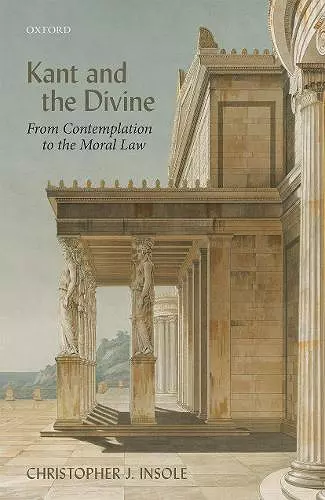Kant and the Divine
From Contemplation to the Moral Law
Format:Hardback
Publisher:Oxford University Press
Published:8th Apr '20
Currently unavailable, and unfortunately no date known when it will be back

The book offers a definitive study of the development of Kant's conception of the highest good, from his earliest work, to his dying days. Insole argues that Kant believes in God, but that Kant is not a Christian, and that this opens up an important and neglected dimension of Western Philosophy. Kant is not a Christian, because he cannot accept Christianity's traditional claims about the relationship between divine action, grace, human freedom and happiness. Christian theologians who continue to affirm these traditional claims (and many do), therefore have grounds to be suspicious of Kant as an interpreter of Christian doctrine. As well as setting out a theological critique of Kant, Insole offers a new defence of the power, beauty, and internal coherence of Kant's non-Christian philosophical religiosity, 'within the limits of reason alone', which reason itself has some divine features. This neglected strand of philosophical religiosity deserves to be engaged with by both philosophers, and theologians. The Kant revealed in this book reminds us of a perennial task of philosophy, going back to Plato, where philosophy is construed as a way of life, oriented towards happiness, achieved through a properly expansive conception of reason and happiness. When we understand this philosophical religiosity, many standard 'problems' in the interpretation of Kant can be seen in a new light, and resolved. Kant witnesses to a strand of philosophy that leans into the category of the divine, at the edges of what we can say about reason, freedom, autonomy, and happiness.
In his own approach to Kant's view of freedom, Insole explores a diametrically opposed reading that revels in a headier conception of metaphysics. Insole's project is strengthened by its careful and sometimes dogged attention to Kant's text. * Jessica Tizzard, University of Tübingen, Journal of the American Academy of Religion *
Christopher Insole's Kant and the Divine is a splendid work that presents Kant's moral philosophy with clarity and judiciousness ... Insole permits us to read Kant's philosophical religiosity in the way that theologians might read Plato, Aristotle, Avicenna, or even Iris Murdoch. We are freed from asking how it does or does not fit with Christianity and nonetheless are able to see it as a deeply religious ethic, inspiring and beautiful. * D. Stephen Long, Modern Theology *
Insole has written a remarkable and remarkably ambitious book. It is clear, comprehensive, and rigorously argued ... This book will be essential reading for undergraduates, graduate students, and scholars who are interested in the intersection of Kant's moral philosophy and his philosophy of religion, and it promises to exercise a considerable influence on Kant scholarship for the foreseeable future. * Samuel Stoner, Review of Metaphysics *
This is an exemplary account of Kant's writings about God, freedom and religion, which covers all Kant's many published works ... The book moves through illuminating discussions of such things as the nature of divine ideas, moral freedom, what is meant by the 'supreme good', the nature of morality, God, grace and religion. It is an intellectual feast, and if for some it may make Kant seem odder and more remote from present concerns, it will also inspire original thinking about how far Christian faith could or might need to be reconfigured or replaced by a religion of reason without revelation. * Keith Ward, Theology *
Magisterial is no doubt an overused word, but it is definitely the most fitting description of Kant and the Divine. In fact, each chapter of this book is magisterial. * Clare Carlisle, Studies in Christian Ethics *
[An] immensely rich and well-researched book ... [that] challenges our understanding of both Kant's ethics and his religious philosophy. * Kienhow Goh, Kantian Review *
Christopher Insole's Kant and the Divine is a magisterial study of Kant's inseparable philosophy of religion and moral philosophy. Against recent fashion, Insole argues that Kant is a deeply religious thinker, but by no means a conventional Christian. For Kant, what is divine is above all autonomous human freedom, the capacity of human beings to set their own ends within the framework of reason, although it is also rational for humans to believe that God makes it possible for them to do this harmoniously and thus achieve the highest good on their own. This book is a landmark. * Paul Guyer, Brown University *
This is a major contribution to the study of Kant and indeed to the philosophy of religion more broadly. It is the definitive study, and one with which its successors must contend. There is nothing like this in print, either in breadth or in detail. It will require subsequent scholars of Kant, and in the philosophy of religion more widely, to raise their game. * Nicholas Adams, University of Birmingham *
This is a comprehensive and compelling account of Kant's philosophical theology. Insole offers an interpretation of the trajectory of Kant's thought, from Kant's early discussions regarding the harmony and perfection of the created order, to Kant's critical emphasis on autonomy and its implications for his understanding of God. He is master of a broad swath of Kant's texts, from the pre-critical to the critical period and is also in command of the secondary literature... [H]is thesis is a bold and imaginative one for which he makes a good case, and his work will certainly generate many scholarly responses. * Jacqueline Mariña, Purdue University *
I recommend this book as a tour de force analysis of Kant's moral enterprise and the nature of freedom. It also makes a strong argument for the essentially theistic nature of the human ethical and communal quest for the highest good. It has real, albeit limited, value for the ongoing debate over Kant's classic Religion text. * Chris L. Firestone, Journal of the History of Philosophy 61.1 *
ISBN: 9780198853527
Dimensions: 230mm x 161mm x 28mm
Weight: 758g
432 pages